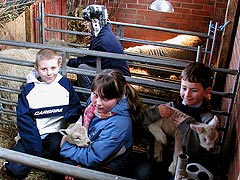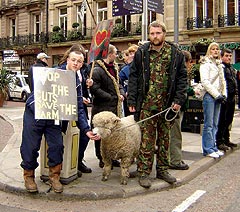
| HOME |
| NERVE |
| REVIEWS |
| ARCHIVE |
| EVENTS |
| LINKS |
| ABOUT US |
| CONTRIBUTORS |
| BACK ISSUES |
| CONTACT US |
 ‘We’ve
survived foot and mouth, but we can’t survive the city council cuts’
‘We’ve
survived foot and mouth, but we can’t survive the city council cuts’
Rice Lane City Farm is tucked away from the speed and stress of city life, set in the beauty of woods and next to the tranquil sobriety of the paupers' graves of, amongst others, Robert Tressell, author of "The Ragged Trousered Philanthropists". As you approach the farm from the railway station, the high security walls of Walton Gaol cast an ominous shadow.
Liverpool City Council announced reduced funding to the farm in January, as they did to other voluntary and community groups. Although they have since restored a part of this money, it still leaves some groups with nothing and others having to reduce services.
Executive Manager Ros Purcell explained the effect on her association which runs the City Farm. "We will be reducing our animal stock in the short-term to save on overheads, with natural wastage and animals going to other farms for 'a holiday'. Some staff on both of our sites have had to be made redundant."
"Endangered species of sheep, goats and pedigree cattle are all threatened by these cuts." Colin Barry, Projects Manager for the farm says, "Eight years we've been keeping rare breeds and we've spent a lot of money. We won't have the staff to maintain the farm."
Jennie Turner, who is the play worker and looks after the admin, talked about the other activities of the farm. “I work at the farm with my mother, and my daughter goes to the farm as well. So that’s three generations. I’ve been using the service for twenty years. We run junior clubs and youth clubs and we have animal husbandry work shops and arts and crafts, everything for kids.”
“We are a grass roots community organisation offering a citywide service, and that’s not recognised by this council.” Maria Hornsby, Youth and Education Worker adds. “We’re doing things for real here. Watch the young people from my youth club and you will see how they understand about respect, and then there’s the work we do in relation to alcohol abuse. This is nothing that we are getting funded for; it’s all organically led. We’ve also supported groups from the black and ethnic communities of Liverpool in their appeals, when they don’t even know what they’ve been rejected on. They’ve come here because they don’t know where else to go for support. One of the things we find offensive is that the bid forms the council put out were just in English, which could be second or third language for people in these groups. Because they missed one tick box, some of the bids were binned. You would need to be a Philadelphia lawyer to understand the forms.
“The city council is quite happy to quote us when they’re writing funding bids. We fit all their ‘objectives’ and ‘criteria’. But when it comes to recognising the work that we do it’s completely different.”
The process of applying for grant funding has been a farce: a cynical exercise of deliberately announcing massive cuts, and then, on appeal, giving something back in the hope that this will water down resistance. An executive panel of three has decided, sometimes in quite an arbitrary manner, the future of groups who rely on this money to maintain services.
 The
budget has been set at £4.7m for the last two years, which amounts
to a cut in real terms of at least 2.5%. This year the amount allocated
was initially £3.2m although central government actually increased
the funding to the council in this area.
The
budget has been set at £4.7m for the last two years, which amounts
to a cut in real terms of at least 2.5%. This year the amount allocated
was initially £3.2m although central government actually increased
the funding to the council in this area.
The Labour group of councillors have decided to take the Lib Dems to a Judicial Review. Paul Thomas is the solicitor working for them: “Liverpool City Council say this is not cost cutting, it is reallocation, but they did not decide the figure until all the tenders came in. Nobody knows how much the council want to save!”
According to the Liverpool Echo of 24.02.05, Council leader Mike Storey has said: “We need to build up our reserves and we have a commitment to put £5m a year towards the Capital of Culture.”
Joe Anderson, Leader of the Labour group comments, “The political ideology is to privatise all voluntary sector organisations.” He accuses the Lib Dems of gerrymandering, (manipulating political boundaries so as to favour one party). “We are looking at the funding being cut in Labour controlled areas, and increases in funding in Lib Dem controlled areas and why many of the directors of these new privatised companies are Lib Dem councillors.”
There will be a ‘knock-on’ loss in human and financial terms with some groups losing staff. Merseyside Welfare Rights have lost £260,000 and are struggling to stay open whilst the Vauxhall Law Centre is to close completely on 12th April. The loss of funding can be multiplied countless times, because groups rely on this funding to generate other income. It will lead to less benefits being claimed and a reduction in play schemes and provision for the old.
Although seething with anger about the way their group and others have been treated, work has been intense lately on the City Farm because it’s the lambing season.
Printer friendly page